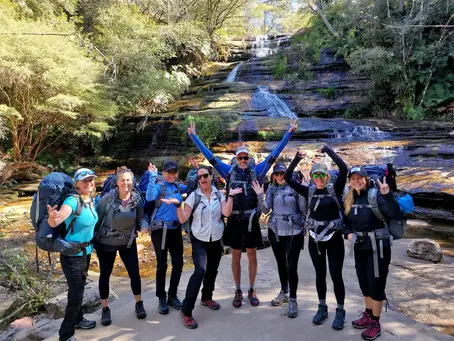If you’re already a pro, then these tips might seem a little basic. But everyone remembers being a beginner at something and having all sorts of silly and wonderful questions bouncing around in their head.
As a seasoned hiker, I’ve learned the hard way how important it is to prepare properly for a hiking trip. If you’re a hiking novice who’s desperate to jump into your walking boots and explore the unknown, then I’ve compiled a list of my top tips of hiking essentials for beginners to ensure you start out your hike on the right foot! Trekking for beginners can be daunting, but not if you do your research and come prepared.

The Right Boots
Hiking 101, choose the right boots. This may seem pretty obvious, but you wouldn’t believe how many times I’ve seen blisters ruin a trek. Taking the time to choose the right boots can make a world of difference. First things first, how should a boot fit? You want it to be snug, but not tight and make sure you have room to wiggle your toes. When heading off to buy a pair of boots, go at the end of the day when you’re feet are slightly swollen. Make sure to take a pair of hiking socks for the full effect.
Most importantly of all, wear your boots in. Starting a hike in a pair of boots that have never made contact with the soles of your feet is a recipe for disaster. Your angry feet will not be happy that the first time they are meeting their new companions is on a day of intense hiking, and they will definitely punish you for it. Make sure you introduce them well in advance and gradually. Pop them on while you’re washing the dishes or heading out to the shops, let them bond so that by the time you hit the trails, your patience will be rewarded with blister-free trotters!
Pre-Hike Exercises
A lot of people underestimate the importance of getting in shape for a hiking trip, but if you’re a city slicker who’s more used to footpaths and pedestrian crossings than mountain trails, your legs might be in for a bit of shock. One way around this hurdle is to build up the muscle before you hike.
We worked with a leading personal trainer from Sydney to design a comprehensive training plan that is specifically designed to help build up the muscle’s used while hiking, and the cardio endurance required for any trekking adventure. It’s free with any booking, but if you’re interested in getting a copy, just get in touch with us and we’ll happily flick it your way
A few weeks before your trek, take some time out of your day, maybe 2 or 3 times a week, to pump out some of our recommended exercises. Lunges and squats are ideal for building up strength in different parts of the leg. Even going up and down the steps in your house or office, a few times a day can give you that extra strength to get up the hill in less of a sweat.
Fueling Up
With trekking, like most sports or physical activities, food is fuel. Eating the right foods before, during, and after your hike can raise your energy levels and help you get the most out of the trail. And also, as a committed foodie, I personally know that there is nothing as wonderful as eating good, quality food in the bush!
The morning of your hike, opt for a nutritious bowl of porridge and fruit or protein-rich eggs, for slow-release energy. Steer clear of anything with high levels of sugar, such as fruit juice, which will only spike your energy and then leave you feeling flat.
Speaking of liquids, make sure to hydrate your body with between 1-2 litres of water, and keep sipping throughout the hike. But, remember not to overload your stomach, setting out on a full stomach can be an invitation for some serious indigestion.
It doesn’t stop there (thankfully), mid-hike snacks are the key to keeping energy levels up. Prep your backpack with hiking snacks like trail mix, energy bars, and fresh fruit. Preparing your own snacks is also a great way to avoid any single use plastics and ensure you adhere to the “leave no trace” philosophy.
Post-hike, you will want to replace some of the calories you lost while on the trail. I recommend you treat yourself a large and protein-rich meal and a nice craft beer, you’ve earned it!
Mental Preparation
Finally, and perhaps most importantly for beginners setting out on longer hikes, the biggest challenge can often be mental rather than physical. Knowing you can make it up that steeper trail can boost your confidence and make the hike a more enjoyable experience. Getting in a few practice walks before your trip can help calm any anxieties you may have about getting to the end of the trail or keeping pace with a larger group.
These tips are to help you get the most out of your hike. At the end of the day, my goal is to get you out there and exploring. If you don’t have time to follow this guide, don’t let it stop you from embarking on hiking adventures. But in the future, as you start to get more serious, come back to these tips, try them out, and see for yourself the difference they have.
